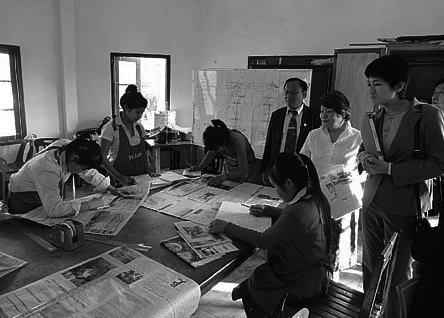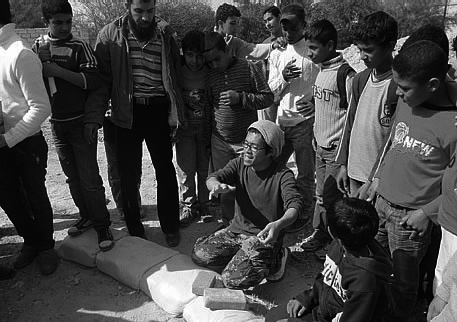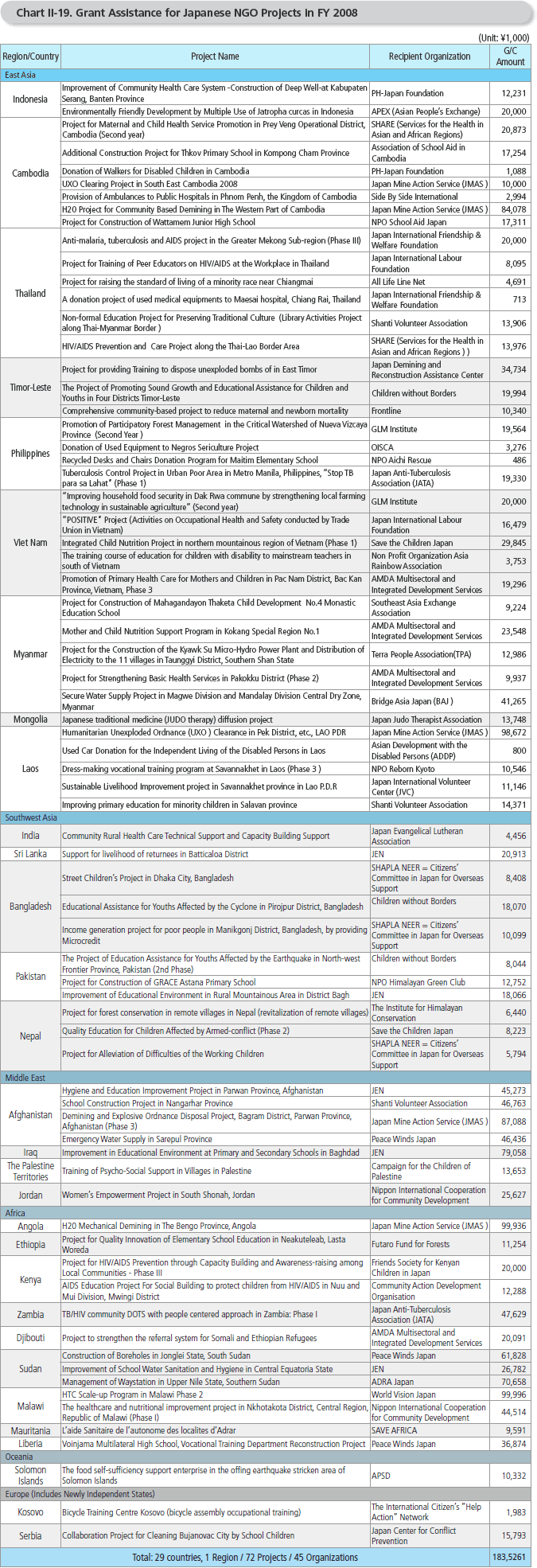Japan's Official Development Assistance White Paper 2009
(6) Cooperation with Aid-Related Entities within and outside of Japan
Japan is implementing international cooperation in collaboration with various groups including private sector enterprises, NGOs, universities, local governments, international organizations, and other donor countries.
(a) Collaboration with NGOs
In recent years, NGOs are carrying out an important role within the international community through such efforts as advocating policies in major diplomatic areas such as the environment, human rights, trade, and disarmament. Japanese NGOs implement high-quality aid activities in various fields of development cooperation, including education, health and medical care, water supply, refugee assistance, and mine clearance. In addition, Japan's NGOs work to provide prompt humanitarian assistance in areas where there have been large-scale natural disasters and conflict. NGOs possess knowledge of the needs of local residents and are capable of conducting activities in areas that the government cannot reach. NGOs also produce visibility of Japanese aid. The necessity of promoting cooperation with NGOs has been detailed in the ODA Charter as well as in Medium-Term Policy, and Japan is engaged in a variety of activities for promoting collaborations with NGOs, including financial cooperation for NGO aid activities, assistance for capacity development, and promoting dialogue.
(i) Cooperation with NGO Activities
Japan is engaged in various forms of cooperation for enabling NGOs to carry out aid activities smoothly. In 2008, for instance, 45 organizations implemented 72 projects, including for the construction of schools, operations of health and medical facilities, occupational training, and construction of wells, using Grant Assistance for Japanese NGO Projects to the grassroots level socioeconomic development projects of NGOs. In addition, as of December 2009, the Japan Platform (JPF)—an emergency humanitarian assistance organization established in 2000 through partnerships with NGOs, governments, and the business community—had received participation from 32 different NGOs that are conducting such activities as promptly distributing everyday goods and providing medical assistance in the event of major natural disasters by utilizing ODA funds disbursed beforehand as well as donations from corporations and residents. In 2008, a total of approximately ¥1.65 billion was provided for 57 projects implemented in nine nations and one region. These projects included disaster assistance for victims of the cyclone in Myanmar, assistance for the earthquake victims in Sichuan, China, humanitarian assistance in southern Sudan, and humanitarian assistance in Iraq. Also, in 2009, NGOs conducted victim assistance activities in response to the earthquake that occurred on the coast of Sumatra in Indonesia and flooding in the Philippines.
In order to utilize the know-how of private organizations such as NGOs, from FY2007 JICA has conducted Project Formulation Studies (Note 50) based on private sector proposals for survey to collect a wide range of views at the project formulation stage. In addition, JICA commissioned private organizations with implementing 211 projects in FY 2008 by utilizing technical cooperation. The expertise of a variety of organizations has been employed in recent years, as NGOs and universities have been commissioned to implement a variety of projects. Also, JICA is implementing projects of JICA Partnership Program (JPP), which are proposed by NGOs, local governments, and other bodies, and implemented on a contract basis, directly contributing to improvement of the lives of residents in developing countries, and related to the Country Assistance Programs. In particular, Partner Type of JPP includes assistance for developing countries that make use of the experience and expertise accumulated by NGOs and other entities that have a certain degree of experience in the international cooperation sector.

On December 23, 2009, Parliamentary Vice-Minister for Foreign Affairs Chinami Nishimura toured an occupational training center for women operated by the Japanese NGO IV-Japan during a visit to Vientiane in Laos. IV-Japan was established in 1988, and it engages in international cultural exchanges and projects to support agricultural development and occupational training in Thailand and Laos. At the occupational training center for women in Vientiane, it carries out occupational training in areas such as cooking, sewing, and hairdressing and contributes to the entrepreneurial efforts and promotion of independence of young women in Laos as a JICA grassroots partner project. In the photograph above, women students studying in a beginning-level sewing course are doing drawings of Laotian-style blouses. They will make the blouses out of cloth based on the drawings that they create. Once they progress to the advanced course, they will be able to actually sell the items they made. These women are working hard each day to learn the skills for their profession and built their own future, They will surely become a driving force supporting future development in Laos.
(ii) Enhancing the Environment for NGO Activities
Additional assistance measures within NGO activities are the various projects for developing the environment for NGO activities. For instance, under the NGO Consultant Scheme, NGO staff commissioned by MOFA respond to consultations and inquiries from citizens and NGO personnel on issues pertaining to the establishment, organization management, activities, and international cooperation activities of NGOs. In addition, the Program provides consultations at international cooperation events and other venues while also offering services where personnel are dispatched to hold seminars. In this way, efforts are being made to promote NGO activities as well as understanding of NGO activities. Furthermore, efforts are being made to increase the management ability and expertise of NGOs. One example of these efforts is the NGO study group. This Program includes holding seminars to promote improving the accountability of NGOs, study groups held by NGOs themselves on various themes such as advancing partnerships with businesses, as well as symposiums.
JICA also provides a wide range of support for NGO staff. For example, JICA conducts 1) NGO human resource development training, where training is conducted on project management for improving the capacity of project implementation in developing countries, as well as on organizational management for enhancing the public relations and fund-raising abilities domestically, 2) project cycle management (PCM) training aimed at acquiring methods for planning, monitoring, and evaluating projects such as those implemented wider the JICA Partnership Program, and 3) dispatching advisors to NGOs domestic offices or overseas project sites to provide face-to-face advice on problems faced by NGOs.

Soil construction workshop in Jordan (Photo: Nippon International Cooperation for Community Development) (NICCO)
(iii) Dialogue and Cooperation with NGOs
In order to promote dialogue and cooperation with NGOs, since 1996 MOFA has held the NGO-MOFA Regular Meetings and engaged in active debate regarding the financial cooperation system for NGOs, such as Japan's assistance policies and the Grant Assistance for Japanese NGO Projects. Meanwhile, from 2002, as a forum for exchanging ideas and opinions with field-level NGOs, it opened the meeting between NGOs and embassies, which is often called "ODA Embassies." Embassy officials, aid implementing agencies, and NGO-related parties have thus far carried out discussion on the efficient and effective implementation of ODA in 13 countries, such as Nepal and Sri Lanka. JICA also holds the NGO-JICA Conference, which promotes the understanding and participation of citizens including NGOs in order to realize more effective international cooperation.

(b) Collaboration with Private Sector Enterprises
(i) Public-Private Cooperation for Accelerated Growth
The activities of private sector enterprises can engender development results in developing countries on a level beyond the reach of ODA alone, as they can promote employment, the transfer of technologies, and expand trade and investment. In April 2008, the "Public-Private Cooperation for Accelerated Growth" was announced along with other measures for promoting public-private collaborations in response to the Interim Report and final memorandum submitted by the Advisory Council on International Cooperation, as well as various recommendations provided by economic organizations. The objective of this measure is to construct a meaningful partnership for both the public and private sectors, share external policies through public-private cooperation, and work together to address development problems. Specifically, the framework is producing concrete results by committing to the three pillars of: 1) adopting and implementing projects proposed by the private sector regarding public-private cooperation (Public-Private Cooperation Offices have been established at MOFA, MOF, METI, and JICA), 2) holding regular policy dialogue between ministries and agencies related to ODA, as well as between the Japanese business community and JICA and other aid implementing agencies, and 3) promoting public-private cooperation in developing nations (establishing "Expanded Country-Based ODA Task Forces" in which local Japanese companies participate).
(ii) Smooth Implementation of ODA Loans
Private-public cooperation is widely recognized as necessary for development assistance to developing countries, and it is important to smoothly produce development effects through effectively organized assistance composed of ODA loans and private-sector businesses. From the perspective of facilitating private-public cooperation as well, it is necessary to promote smooth implementation of ODA loans.
Japan announced Speed Up of ODA Loan Projects by Expediting Government-Industry Coordination in 2009 by taking into consideration ownership of indebted countries, prevention of fraud and corruption, environment and society-friendliness as an additional measure of to promote smooth implementation. The announcement included information sharing on schedules with private sector, and smooth implementation of JICA's designing assistance in Special Terms for Economic Partnership (STEP (Note 51)).
Notes:
(51) In order to make use of Japan's advanced technology and know-how, and to enhance the visibility of Japanese aid through technological transfer to developing countries, Japan introduced STEP in July 2002.
(c) Collaboration with Academia and Local Governments
Japan utilizes the know-how accumulated by academia and local government to implement ODA more effectively. In order to make use of the intellectual assets of universities, JICA concludes contracts with universities to implement comprehensive technical cooperation and promote ODA loan projects. For universities, partnering with JICA allows them easier access to sites in developing nations and the benefit of being able to acquire practical experience. In addition, JICA also partners with local governments in various areas such as qualitative project improvement, development of human resources for aid, and vitalization of regional project deployment.
(d) Collaboration with Local Governments and NGOs of Developing Countries
Working together with local governments and NGOs in developing countries is not only beneficial to the socioeconomic development of the developing nation, but also leads to strengthening civil society and NGOs in the country. Japan utilizes mainly Grant Assistance for Grass-roots Human Security Projects to provide assistance for socioeconomic development projects implemented by these aid-related personnel. This financial cooperation is evaluated highly even in developing nations as a detailed and fast form of assistance that provides direct benefits on the grassroots level.
(e) Collaboration with International Organizations and Other Countries
In recent years, from the perspective of aid effectiveness, various aid bodies have been working to coordinate their assistance policies in aim to achieve international development goals and agreements, including the MDGs, Paris Declaration(Note 52), and the Accra Agenda for Action (AAA). (Note 53) Currently, working groups have been formed for such fields as health and education in a large number of aid-receiving nations, whereupon program-type assistance is being implemented in accordance with the sector development strategy of the nation. Japan too, participates in many of these programs, including agriculture in Tanzania and water in Yemen. In addition, in Bangladesh, Japan has drafted common strategic partnerships with the Asia Development Bank (ADB) and the United Kingdom's Department for International Development (DFID) for assisting the poverty reduction strategies (PRS) of Bangladesh. Therein, Japan is advancing coordination and cooperation with these entities to implement aid more effectively and efficiently in a cross-sectoral manner. Japan also currently participates in working groups among a wider range of donors that meet to draft common aid strategies, thereby actively taking part in aid coordination.
Until now, members of the Development Assistance Committee (DAC) of the Organization for Economic Cooperation and Development (OECD) have been the main aid-providers within the international community. In recent years, however, assistance activities by non-DAC member countries have become noteworthy, including those of Eastern Europe, the Middle East, China, Russia, South Africa, Brazil, as well as Southeast Asian nations such as Singapore and Malaysia. It is important for DAC countries including Japan to share their past experiences regarding aid and cooperate as necessary so that these countries can work together in aim to solve global issues as responsible aid-providing countries.
Notes:
(52) The Paris Declaration complied undertakings to be made by both aid-providing countries and aid-receiving countries in respect to measures that need to be implemented in order to improve the quality and efficiency of aid. The Declaration was adopted at the Second High Level Forum on Aid Effectiveness, which was held in Paris in 2005.
(53) This is an action plan that was adopted in September 2008 in Ghana at the Third High Level Forum on Aid Effectiveness. The plan includes a decision to make further improvements to the effects of aid as well as undertakings to be employed until 2010 in aim of achieving the objectives in the Paris Declaration.
